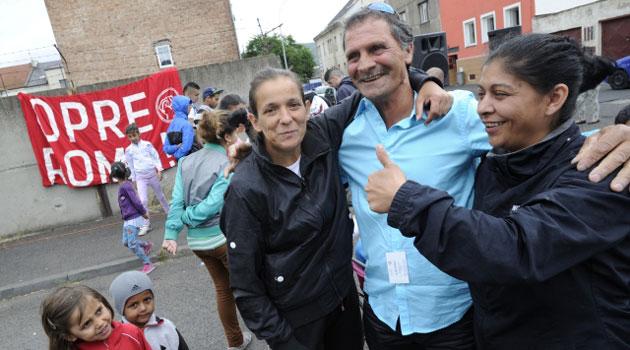European Grassroots Antiracist Movement holds Roma conference in Czech Republic

From 12 – 15 June 2014 a preparatory meeting of activists with the European Grassroots Antiracist Movement (EGAM) took place in Prague to work on the upcoming European Roma Pride celebrations. The meeting was organized by the Konexe association together with the EGAM network.
Conference participants attended a commemorative gathering on Friday 13 June at the pig farm in Lety by Písek, where the American author and human rights activist Paul Polansky guided them on a tour of the genocide site. On Saturday EGAM members met with the Romani community in the Předlice neighborhood of Ústí nad Labem.
The Konexe association intends to invite guests from abroad to visit the country’s socially excluded localities more often. They expect this will mainly result in a change in how Romani integration is viewed, which they believe has completely failed until now despite the investment of no small amount of money from the European Union.
"Programs are failing primarily due to their paternalism. Romani people are viewed as handicapped children who don’t understand the world they live in. Costly projects are created in the offices of the big nonprofit organizations without anyone consulting them with Romani people in any way," says Miroslav Brož of Konexe.
The main purpose of Saturday’s visit to Ústí nad Labem, according to Brož, was to familiarize those attending the meeting with the reality of Romani ghettos in the Czech Republic. "They can see for themselves the results of the integration of Romani people in the Czech Republic and compare it to the myth that everything created by the Czech Government Agency for Social Inclusion, for example, is a success. Many were shocked by the reality," Brož said.
Martin Šimáček, director of the Czech Government Agency for Social Inclusion, says there are significantly more examples of good practices both at the level of nonprofit organizations and in a significant number of municipalities despite the deteriorating situation in the socially excluded localities. "Attacks on those practices don’t just harm the good name of many towns and organizations, but the name of the Romani people themselves who, thanks to these practices, are finding jobs, accessing education, and improving their housing conditions. It is very unfortunate to demonstrate the notion that social inclusion does not work in the Czech Republic solely based on the example of Předlice. That’s the same as if you use the example of one Romani person to generalize about the situation of all Romani people throughout the country," Šimáček told news server Romea.cz when asked for a response to Brož’s statement.
The EGAM conference was attended by as many as 40 delegates from 15 European states and the USA. Grassroots organizations are groups of individuals who organize themselves to follow a common interest; they are usually informal and pursue a wide range of activities.